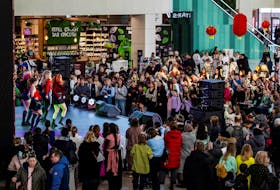Inside a non-descript room on the tenth floor of a Wellington Street office building in Toronto’s financial district, I am playing God.
The occasion is a media preview of Agence (pronounced “Agents”), a virtual reality experience co-produced by the National Film Board, and on its way to the Venice Film Festival this week. Part movie, part video game, it’s been called a “dynamic film” by the team that made it. Pietro Gagliano is its lead creator.
“We set out to make a dynamic film where there are three authors to the story,” he explains. “Myself or my team as filmmakers; the user that will cause effects to an environment; and the agents that live within that environment – the artificial beings. The theory was they would all play off of each other and you’d get a different result every time you view it.”
In practice, after I strap on the (thoroughly cleaned) VR headset and pick up the (likewise) handheld controllers, I find myself looking at a planetoid in space, like as asteroid from The Little Prince . A few simple, geometric beings wander the surface. I pluck one off. It wriggles. I put it back.
Then one of them attacks one of its fellows. This won’t do. I grab the malefactor and drop it into the void. It falls slowly, silently into infinity. I’ve just enforced my first commandment: Thou shalt not hurt thy fellow agent.
We wanted to use the language of cinema more so than the language of a game or a puzzle
But then more attacks take place, and I decide my wrath must be consistent, so into the void goes another. In short order, the planetoid is deserted. Crestfallen, I start again, this time learning how to create a flower, which the agents like. There is less fighting. But the heavy flower causes the planetoid to turn. Agents fall off trying to reach Eden. Clearly, I need more practice at this God thing.
“Human beings when they enter a new environment, especially when it’s a digital one, they want to try things, they want to interact,” says Gagliano. “And most people aren’t afraid to mess it up. So we’re kind of leaning into that behaviour.”
David Oppenheim is a producer at the National Film Board, whose recent credits include the Venice-bound Book of Distance – more on that in a moment – and Draw Me Close , a performance that combines virtual reality and live theatre, and which was to open at Soulpepper in Toronto until the pandemic forced the suspension of the season. (As the title suggests, Draw Me Close was especially problematic.)
“We didn’t want it to feel like a game right off the bat,” Oppenheim says of Agence . Among other things, there’s no tutorial. “We wanted it to feel like you’re in the midst of a story. We wanted to use the language of cinema more so than the language of a game or a puzzle. But the agency you’re given is not typical of a film. We’re sort of merging those worlds.”
They also wanted to use artificial intelligence within the program. So the agents have been trained by their designers through reinforcement learning, meaning each possesses a tiny, individual neural network that drives its behaviour.
“It’s hard to predict what they’ll do even though we made them,” says Gagliano. “I’m convinced that two of them are in love.” Move one of the couple, he says, and the other inevitably finds its way back to its mate.
Agence is one of three VR works from the NFB travelling to the Venice festival this year. Another is The Hangman at Home , by Michelle and Uri Kranot, and based on the poem by Carl Sandberg. The third is Randall Okita’s The Book of Distance , which tells the story of its creator’s grandfather Yonezo Okita, who moved to from Hiroshima to Canada in 1935 and was incarcerated in an internment camp during the Second World War.
I had a chance to explore The Book of Distance , and the experience was about as un-God-like as imaginable. Though it doesn’t directly place you in the shoes of the Japanese who were imprisoned by the government of Canada, you witness the dehumanizing aspect of the treatment. In one scene, you are invited to pack Yonezo’s suitcase for the trip to Canada. Later, you pack for the camps, but a radio and camera have been declared contraband and must be left behind.
It’s an effecting experience, and as usual VR serves to close the emotional distance between viewer and story, by seeming to place one physically inside the tale. Shrugging off the headset, I was also biting back tears.
What’s more, thanks to the pandemic – not a phrase you’ll hear often – the festival has made its VR offerings available online through Viveport, and at several satellite locations including the PHI Centre in Montreal, for the duration of the fest, which runs Sept. 2 through Sept. 12. Agence is also being released in several weeks in both a VR and non-VR version, including a mobile app.
Copyright Postmedia Network Inc., 2020








